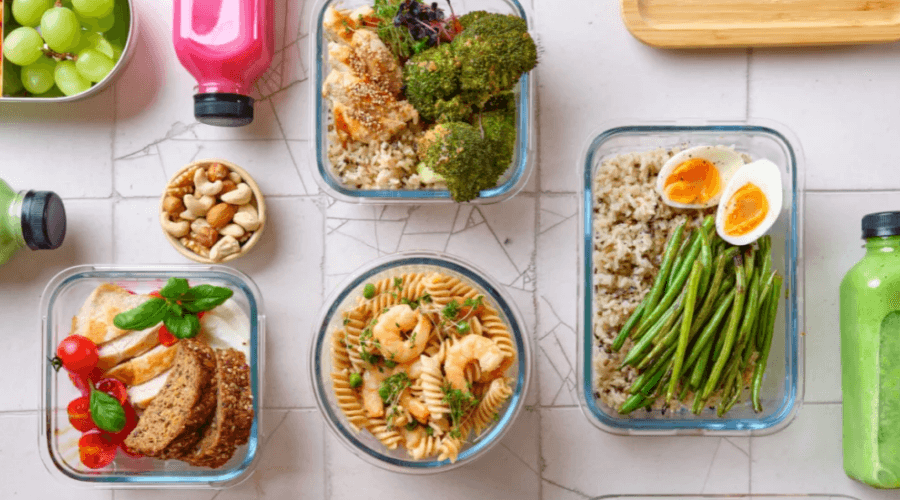As we move into 2025, wellness trends are shifting from calorie-counting to understanding the crucial role our gut plays in overall health. The focus on gut-healthy foods has never been stronger, as science continues to reveal the connection between gut health and everything from mood and immunity to metabolism and energy levels. A balanced gut microbiome—the community of trillions of bacteria living in your digestive system—is essential for maintaining health, longevity, and vitality.
Whether you’re looking to improve digestion, enhance immunity, or simply feel more energized, adding certain foods to your diet can help nurture a healthy gut. In this comprehensive guide, we’ll explore the top gut-healthy foods of 2025, explain why they matter, and show you how to incorporate them into your everyday meals.
1. Fermented Foods: Nature’s Probiotics
When it comes to gut health 2025, fermented foods remain a cornerstone. These foods are rich in probiotics—live microorganisms that help balance the gut microbiome and improve digestion. Common examples include yogurt, kefir, sauerkraut, kimchi, miso, and kombucha.
According to the National Institutes of Health, probiotics can help reduce symptoms of bloating, constipation, and irritable bowel syndrome (IBS). They also support immune function and may even improve mental health by strengthening the gut-brain connection.
Brands like Lifeway Kefir and Seed are leading the charge in 2025 with advanced probiotic formulations designed to survive stomach acid and deliver live cultures directly to your intestines.
Pro Tip: Start with small servings of fermented foods daily to introduce beneficial bacteria gradually. Overconsumption can cause temporary bloating as your gut adjusts.
2. Prebiotic Fiber: Fuel for a Healthy Gut
While probiotics add good bacteria, prebiotics feed them. These non-digestible fibers help beneficial gut microbes thrive, supporting long-term gut health and immunity. Top prebiotic-rich foods include garlic, onions, bananas, asparagus, leeks, and oats.
A 2024 study from Healthline highlighted that increasing prebiotic intake improves gut diversity, which is linked to better digestion, stronger immunity, and reduced inflammation.
One of the easiest ways to include prebiotics in your diet is through chicory root and Jerusalem artichokes, which contain high levels of inulin—a powerful prebiotic fiber. You can also find prebiotic supplements in products like Garden of Life Organic Fiber.
Pro Tip: Pair prebiotics with probiotics—think yogurt with banana or kefir with oats—for a synergistic effect known as “synbiotics.”
3. Whole Grains: Gut-Friendly Carbohydrates
In 2025, whole grains are being redefined as essential for gut-healthy foods. Unlike refined grains, whole grains contain fiber, vitamins, and minerals that promote improve digestion and feed beneficial bacteria.
Examples include quinoa, barley, oats, and brown rice. Studies published in ScienceDirect show that whole grains increase butyrate—a short-chain fatty acid that fuels colon cells and supports anti-inflammatory activity.
Switching from white rice or pasta to whole-grain versions not only helps with digestion but also stabilizes blood sugar and supports heart health. Many dietitians recommend at least three servings of whole grains daily for optimal gut balance.
Pro Tip: Soak or sprout grains before cooking to improve nutrient absorption and reduce phytic acid, which can inhibit digestion.
4. Leafy Greens: Natural Gut Cleansers
Leafy greens like spinach, kale, and Swiss chard are more than just superfoods—they’re crucial for gut wellness. Packed with fiber, chlorophyll, and polyphenols, they nourish the gut microbiome while promoting detoxification.
Recent research from PubMed suggests that chlorophyll-rich greens can help grow beneficial Lactobacillus bacteria, improving gut barrier integrity and reducing harmful pathogens.
Incorporating more greens into your meals—whether in salads, smoothies, or soups—supports digestion and regularity. You can also try superfood blends like Amazing Grass Green Superfood for an easy daily boost.
Pro Tip: Pair leafy greens with healthy fats like olive oil or avocado to increase the absorption of fat-soluble vitamins like A, D, E, and K.
5. Omega-3 Fatty Acids: Anti-Inflammatory Powerhouses
Inflammation is one of the biggest enemies of a healthy gut. Omega-3 fatty acids, found in fatty fish like salmon, sardines, and mackerel, help reduce inflammation and maintain a balanced gut microbiome. They also strengthen the gut lining, preventing “leaky gut syndrome.”
Plant-based sources such as flaxseeds, chia seeds, and walnuts also provide essential ALA (alpha-linolenic acid), which the body partially converts to beneficial EPA and DHA. Supplementing with high-quality fish oil from brands like Nordic Naturals can also support optimal gut function.
Internal link suggestion: For a deeper look at health-forward diets, check out Why Sustainable Eating Is the Future of Food.
Pro Tip: Consuming omega-3s alongside antioxidants like vitamin E enhances their anti-inflammatory effects for gut and overall health.
6. Fermented Beverages: Gut Health in a Bottle
Fermented drinks like kombucha, kefir water, and probiotic sodas are trending in gut health 2025. These beverages deliver live probiotic cultures in a convenient, refreshing form that fits easily into daily routines.
Kombucha, a tea fermented with bacteria and yeast, is especially rich in beneficial acids that promote improve digestion. Similarly, water kefir offers a dairy-free alternative packed with beneficial microbes and natural enzymes.
Popular brands such as Health-Ade Kombucha and KeVita have expanded their offerings to include low-sugar, functional probiotic drinks infused with superfoods like turmeric and ginger for added benefits.
Pro Tip: Drink fermented beverages with meals to enhance nutrient absorption and prevent bloating.
7. High-Polyphenol Foods: Antioxidants for Gut Balance
Polyphenols, powerful plant compounds found in foods like berries, green tea, dark chocolate, and red wine, act as prebiotics that feed beneficial bacteria. They also combat oxidative stress, a key factor in poor gut health and inflammation.
A 2025 report from Nature Journal emphasized that polyphenol-rich diets can increase the presence of beneficial Bifidobacteria and Lactobacilli species in the gut, contributing to improved immune function and digestion.
Foods such as blueberries, pomegranates, and black tea are easy additions to breakfast or snacks, making them a delicious way to support your microbiome.
Pro Tip: Combine polyphenol foods with probiotics to amplify their gut-healing benefits—for example, yogurt with berries or green tea with dark chocolate.
8. Bone Broth: Healing and Hydrating
Bone broth has made a massive comeback in wellness circles, especially among those seeking to improve digestion naturally. Rich in collagen, amino acids, and minerals, bone broth supports the intestinal lining, reducing inflammation and promoting nutrient absorption.
Brands like Kettle & Fire now offer shelf-stable, organic bone broths made from grass-fed sources, making it easier than ever to incorporate this healing elixir into your diet.
Bone broth can also help repair gut damage caused by processed foods, antibiotics, or chronic stress—common disruptors of gut health 2025. Add it to soups, stews, or simply sip it as a warm beverage for maximum benefits.
Pro Tip: Use slow-cooked broths for the highest nutrient extraction. Look for broths that simmer for at least 12 hours.
9. Plant-Based Probiotics and Alternative Sources
As plant-based diets rise in popularity, so do vegan probiotic options. Tempeh, miso, natto, and plant-based yogurts are excellent gut-healthy foods that support microbiome diversity without animal products.
In 2025, the food tech industry is innovating in this space with lab-grown probiotics and synbiotic beverages that combine prebiotics and probiotics in a single formula. Companies like GoodBelly are introducing plant-based probiotic juices designed to optimize gut health.
Internal link suggestion: For more innovation in health tech, read Future Tech: 10 Emerging Innovations Changing the World.
Pro Tip: Rotate between different probiotic sources to maintain microbial diversity in your gut ecosystem.
10. Hydrating Foods and Drinks
Hydration plays a crucial role in gut health and overall wellness. Water helps transport nutrients and waste through the digestive tract, while hydrating foods support optimal digestion.
Coconut water, cucumber, celery, and watermelon are excellent choices for maintaining hydration while delivering electrolytes and fiber. Pair these with high-fiber foods to aid in nutrient breakdown and bowel regularity.
Herbal teas such as peppermint and ginger tea also soothe the digestive tract and relieve bloating, making them great additions to a gut-friendly routine.
Pro Tip: Aim for at least 2 liters of water daily and consume hydrating fruits and vegetables regularly for optimal digestion.
Final Thoughts: Your Gut, Your Gateway to Health
As 2025 ushers in new wellness priorities, it’s clear that gut-healthy foods are at the center of optimal living. A balanced diet rich in probiotics, prebiotics, fiber, and anti-inflammatory nutrients doesn’t just improve digestion—it enhances mood, energy, and immunity.
Whether you’re sipping kombucha, enjoying whole grains, or blending leafy greens, these foods can help you achieve better gut health and overall wellness. The key is consistency: nourishing your gut daily with diverse, whole, and nutrient-rich foods.
As the saying goes, “You are what you digest.” Start supporting your gut today and experience the difference from the inside out.




